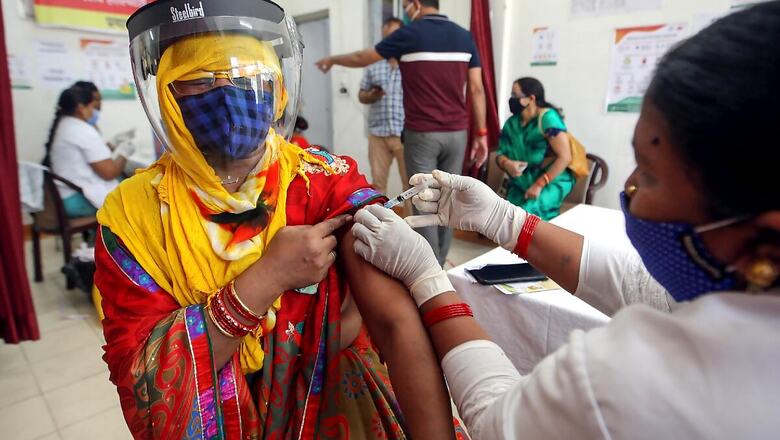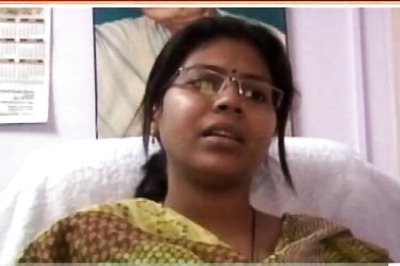
views
Over 88 million of the population in India has been vaccinated against Covid-19 till Wednesday, April 7, making the country one of the fastest vaccinating nations in the world. Over 77 million Indians have been jabbed with a single dose of Covid-19 vaccines, while 11 million plus stand fully vaccinated i.e. having received both the prescribed doses of the vaccine, said a release by the Union Health Ministry.
The United States, which began its vaccination drive on December 14 last year, has inoculated over 108 million citizens with the first dose while the United Kingdom has vaccinated around 32 million people with at least one dose in its nationwide drive that began on December 8, 2020.
Despite having started late with vaccination drive on January 16 this year, India has not only managed to catch up with its global peers but has also become the country to run the second fastest anti-Covid vaccination drive globally. The United States, in the 116th day of its vaccination drive, remains on top of the list as of now.
According to a rough estimate, India on an average has been administering around 10.77 lakh vaccine doses daily since the beginning of its inoculation drive. The US, on the other hand, pumps over 14.66 lakh doses daily into its citizens and the UK has been inoculating at the pace of over 3.06 lakh average doses daily.
Brazil which has the world’s second-highest death toll from Covid-19 has been on an average administrating over 2.85 lakh doses daily since the South American nation rolled-out its inoculation drive on January 18, 2021.
However, the lead in vaccination drive for India may end here. The US has comparatively under four times lesser population than India while the UK, with over 6.6 crore people, is twenty times smaller than India in terms of population numbers.
With the same or lesser effort as compared to India, the US has vaccinated over 30% of its population by at least one dose of the Covid-19 vaccine, and the UK, till Monday, neared its half-way mark by having inoculated at least 46.6% of its population with a single dose.
Israel, with over 9 million population, however, remains the frontrunner having vaccinated 61% of its people with the first dose of the Covid-19 vaccine. Due to low population load, the country has achieved the feat in just 110 days by vaccinating around 92,000 people on an average daily, since the beginning of the drive on December 19, 2020.
On the other hand, India, till Tuesday evening, managed to vaccinate just 5.5% of its population with a single dose of the two doses of prescribed vaccination, according to data compiled by the University of Oxford. Experts suggest this as a clear urgency for the government to inoculate at a much faster rate, given that the Covid-19 wave has turned into a tsunami of sorts in the country.
Comparing India’s vaccination pace with countries with much lesser populations just doesn’t fit well into the need of the hour. While many wealthy western nations have indulged in vaccine hoarding, creating a demand-supply imbalance of the precious vial of life, India, on the other hand has remained extremely philanthropic in its approach on equitable distribution of vaccines globally.
According to Amnesty International, the G7 nations including the UK, France, Germany and Italy have enough Covid-19 vaccine doses to inoculate their populations three times over.
On the contrary, India has supplied over 64.5 million ‘Made in India’ vaccine doses to other countries. Guided by its core philosophy of ‘Vasudhaiva Kutumbakam’, the government dispatched over 10.5 million doses to friendly countries and poor nations which have been left out in the global race for Covid-19 vaccines.
Further, 18.1 million doses of India made vaccines have reached to vaccine-deprived nations through COVAX – a global initiative aimed at equitable access to COVID-19 vaccines led by UNICEF, Gavi, the Vaccine Alliance, the WHO and others.
However, in India, intense political slugfest has erupted over claims of vaccine shortage with Maharashtra, the worst-affected state, raising the red flag over the issue. Vehemently denying any scarcity in vaccines, the Centre blamed the Uddhav Thackeray-led state government’s lackadaisical approach for “singularly bogging down the entire country’s efforts to fight the virus”.
On the other hand, states like Maharashtra and Delhi, and some opposition leaders, have demanded the Centre for relaxation in the age limit for vaccination in view of rapid spike in Covid-19 cases in the country. Citing international examples, the Centre on the other hand, has said that the aim of vaccination is not to ‘administer the vaccine to those who want it but to those who need it’.
While India has been facing an insurmountable challenge of containing the rapid spread in infections, the critical issue of vaccine wastage (around 6% nationally) has posed yet another challenge for the government. Last month, Union health secretary Rajesh Bhushan red flagged the subject of higher wastage of vaccines in five states including Telangana, Andhra Pradesh, Uttar Pradesh, Karnataka and Jammu and Kashmir.
Given India’s population size, if the case rise continues unabated, the country’s fragile healthcare system will sooner or later collapse. Administrative tools like curfews and lockdowns have their own limitations and if imposed for a longer period will hurt the green shoot visible in the economy. Given such constraints and urgency for rapid vaccination, deregulating vaccine supply would not be a bad idea. Those who could afford it can buy it at a market rate for others the government can foot the bill.
Read all the Latest News, Breaking News and Coronavirus News here. Follow us on Facebook, Twitter and Telegram.


















Comments
0 comment